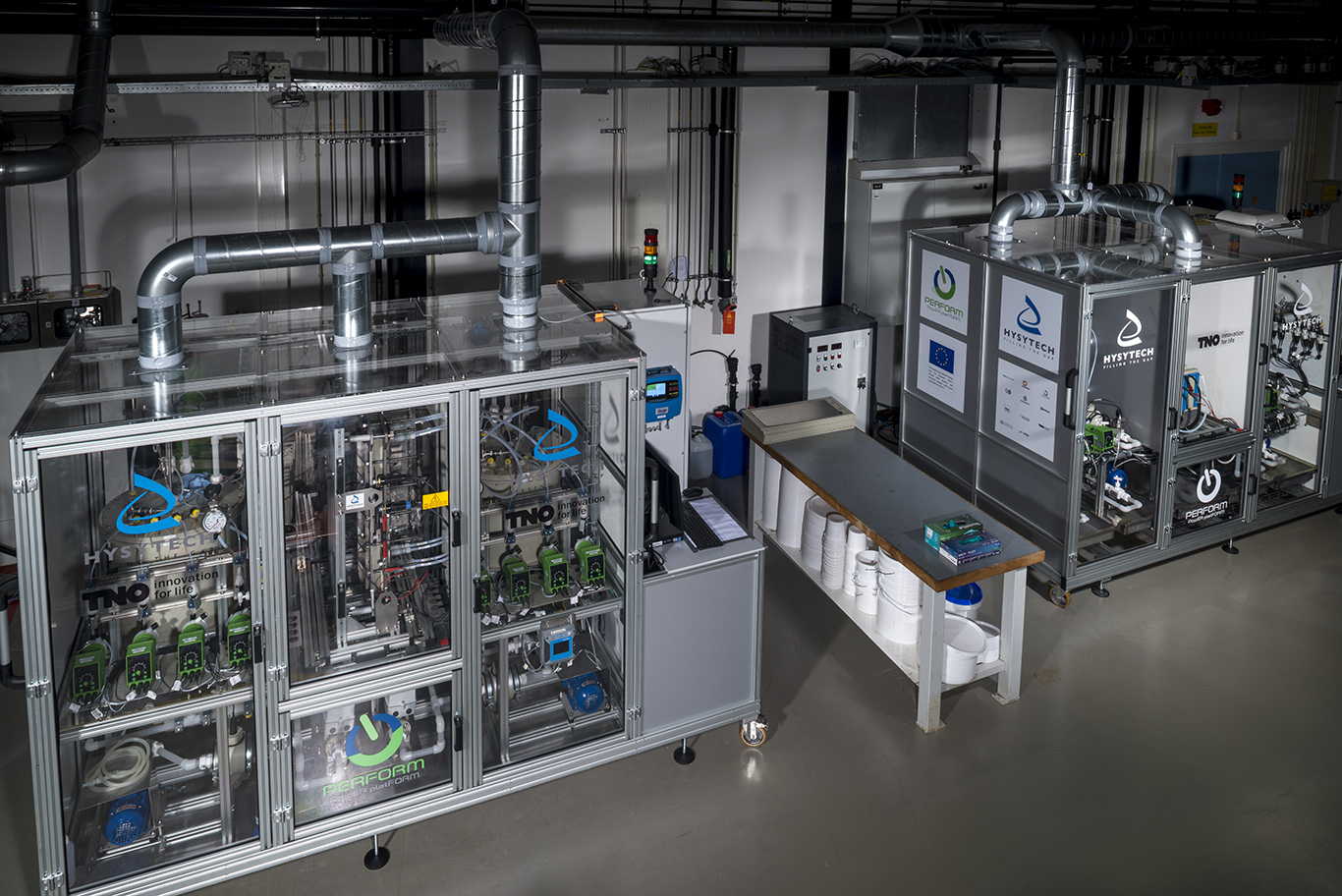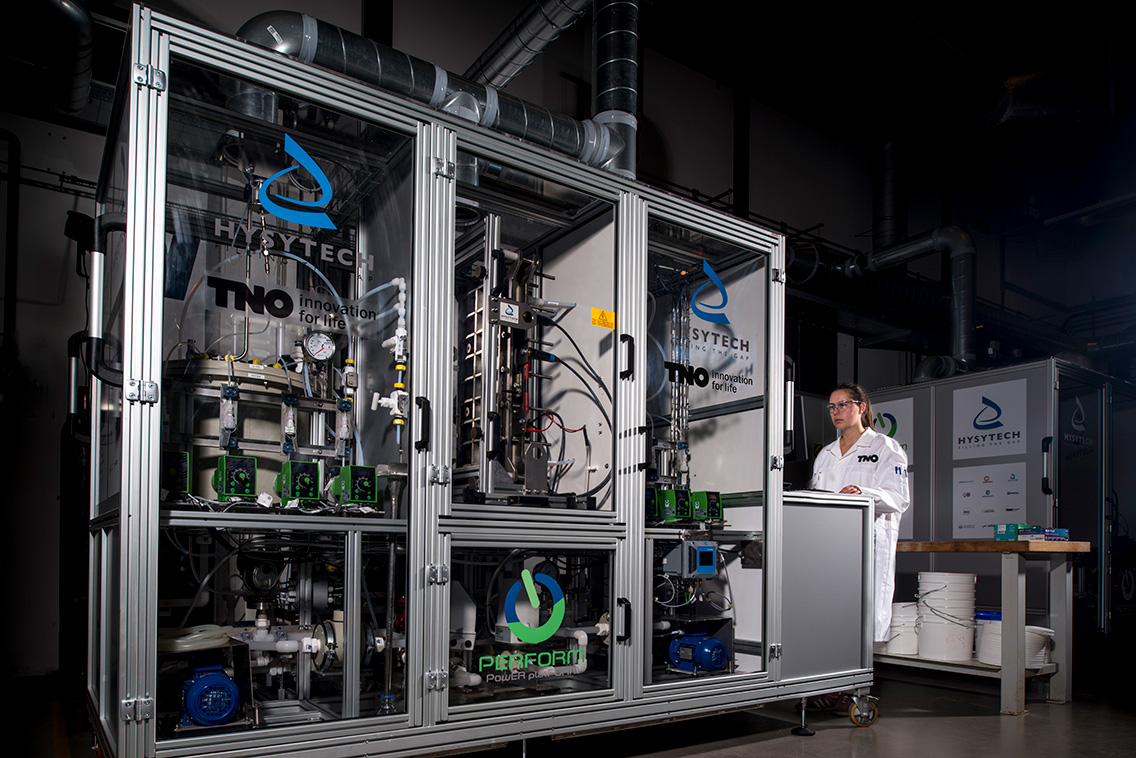

PERFORM: using green electricity and renewable feedstocks to create high-value molecules
21-09-2023 | P2Chemicals
 A major advance towards making the chemical industry more sustainable: the EU PERFORM project will conclude at the end of the year – and the results are already spectacular. Electrochemistry allows the industry to produce far more efficiently, while cutting CO2 emissions by half. After successful laboratory trials, a pilot test setup at TNO has demonstrated that many chemical products can be manufactured from non-food biobased renewable feedstock and green electricity. This brings us another step closer to cutting out fossil fuels.
A major advance towards making the chemical industry more sustainable: the EU PERFORM project will conclude at the end of the year – and the results are already spectacular. Electrochemistry allows the industry to produce far more efficiently, while cutting CO2 emissions by half. After successful laboratory trials, a pilot test setup at TNO has demonstrated that many chemical products can be manufactured from non-food biobased renewable feedstock and green electricity. This brings us another step closer to cutting out fossil fuels.
Within the VoltaChem program, researchers in a large consortium are working on electrification of the chemical industry. One route is to convert raw materials into valuable chemicals using green electricity. This is done with CO2 but also by converting agricultural and biological waste streams into useful chemicals in the PERFORM project.
A world first
VoltaChem/TNO expert Riccardo Zaffaroni explains: “We and our partners from science and industry succeeded in generating bio-based products on a scale of six kilograms per day on an area of just one square metre using electrochemical conversion. That’s a world first! We converted low-value molecules from plant waste into high-value molecules such as maleic acid and valeric acid. These are valuable intermediate products for the chemical industry.”
Environmental impact significantly reduced
PERFORM is an innovation project within the EU’s Horizon 2020 programme. It aims to develop efficient, integrated electrochemical processes to help the chemical industry switch from fossil to sustainable feedstocks, using renewable energy to do so. The benefits are therefore twofold. Using both renewable energy sources and biobased feedstocks significantly reduces the environmental impact of the chemical industry.
Regionally available feedstocks
“And that’s sorely needed too,” says Riccardo. “The chemical industry still operates predominantly on fossil fuel, and its production processes generate a high level of CO2 emissions. Recent geopolitical developments have highlighted more than ever that Europe is heavily dependent on other countries for fuel and feedstocks. It’s essential for the EU to become self-sufficient as soon as possible. The PERFORM project fits in perfectly with that ambition. It involved developing technologies and processes based on regionally available waste from agriculture and forestry, utilising renewable energy. And it was successful!”
The picture above features the one of kind electrochemical reactor (the core of the PERFORM project) it’s a stack of 10 cells for a total electrode surface area of 1m2 used to generate products from biobased renewable feedstocks and green electricity. Catarina Simões has just assembled the reactor and she is about to install it into the pilot setup.
Efficiency up by tens of percentage points
The technology developed in PERFORM is suitable for various types of companies and processes within the chemical industry. For the time being, the researchers have focused in particular on plastics, lubricants, and fragrances. The sources were molecules of biobased feedstocks from waste streams such as lignocellulose and straw. These materials were the starting point for conversion into high-value molecules.
“We achieved a 30 to 40% increase in efficiency in the process, but I expect that this percentage can be even higher for certain processes. And, to be fair, for others it may perhaps be slightly lower – although even then we’re still talking about pure profit. Moreover, we managed to boost the purity of the products to more than 90%, and with further optimisation we can even move towards 100%.”
Complexity of chemical reactions reduced
Another sector that Riccardo says can benefit from the technology developed in perform is the pharmaceutical industry. “That’s because we managed to integrate various different processes, meaning a huge reduction in the complexity of the chemical reactions. Here too, it’s about manufacturing high-value products, efficient and cost-effective production, and a significant reduction in CO2 emissions.”
The researchers succeeded in making two chemical reactions possible within a single reactor. That means double the result from the same amount of energy, thus cutting costs by half. The outcome of the process is two different molecules with added value. “Tandem reactions” are also possible, i.e. when the reaction in one part of the reactor feeds a different part of the reactor, for a subsequent different reaction. Only one reactor is therefore needed to implement two different processes, making the entire operation much simpler, more efficient, and cheaper.
Open innovation environment
Riccardo stresses that the pilot, officially the “perform PowER platFORM”, is an open innovation environment within which companies are welcome to experiment and carry out trials. A number of successful projects have already been carried out, for example, in which various concepts were applied in collaboration with partners. One of them was to produce plastic using biobased feedstocks and green energy, based on the new technology.
“The project will soon be finished,” says Riccardo, “but the know-how and installations will remain. It’s an open access infrastructure within which the chemical industry and research partners can build on the results and design and test electrochemical processes. You have to realise that what’s been achieved here is truly globally unique, and is a launchpad for marvellous innovations in the near future. Companies that came to visit couldn’t believe their eyes!”
Refine and optimise
In the final phase of the project, a lot of hard work is still going on to further refine and optimise the results already achieved. This is mainly being carried out by the scientific researchers from the collaborating research institutes, but Riccardo hopes that the business community will get involved too. After all, the aim is for them to put into practice what has been developed in perform, and for what has now been demonstrated on a pilot scale to soon become reality in large-scale production processes.
“We’ve demonstrated the stages for getting from biobased feedstocks with simple molecules to ultra-pure, high-value molecules that are relevant for the chemical industry. The figures show how efficient that can be, how the conversion works, and what the costs are. We’ll be presenting the exact results at the end of the year. It’ll then be up to the business community to make real progress with this technology to make their processes more sustainable.”
Interested to learn more? Sign up for the PERFORM workshop: Reduction of the CO2 in the chemical industry on October 4th, more details here.
Consortium
The perform project was coordinated by TNO, in collaboration with the research institutes VITO (Belgium); INSTM, National Interuniversity Consortium of Materials Science and Technology (Italy), University of Hohenheim (Germany) and the companies AVA Biochem (Switzerland), Avantium (Netherlands), Novamont, RadiciGroup and Hysytech (Italy), Sustainable Innovations (Spain), and Perstorp (Sweden).
Share this page:

